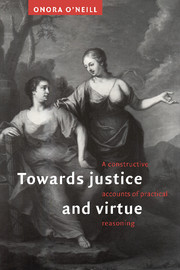Book contents
- Frontmatter
- Contents
- Preface
- Introduction
- 1 Overview: justice against virtue?
- 2 Practical reason: abstraction and construction
- 3 Focus: action, intelligibility and principles
- 4 Scope: agents and subjects: who counts?
- 5 Structure: obligations and rights
- 6 Content I: principles for all: towards justice
- 7 Content II: principles for all: towards virtue
- Bibliography
- Index
2 - Practical reason: abstraction and construction
Published online by Cambridge University Press: 05 June 2012
- Frontmatter
- Contents
- Preface
- Introduction
- 1 Overview: justice against virtue?
- 2 Practical reason: abstraction and construction
- 3 Focus: action, intelligibility and principles
- 4 Scope: agents and subjects: who counts?
- 5 Structure: obligations and rights
- 6 Content I: principles for all: towards justice
- 7 Content II: principles for all: towards virtue
- Bibliography
- Index
Summary
It is one thing to suggest that discussions of justice and of virtue have diverged because different responses to a crisis in their supposed shared foundations have proved easier for the two domains of ethics, another to imagine how the crisis might be overcome. What methods or approaches can ethical reasoning use if it starts neither from a conception of the objectively good (whether transcendent or inherent) nor from a naturalistic conception of subjective good that supposedly supplants objective conceptions, nor from the ‘deep’ particularities of common or of individual life? How else could we identify either convincing premisses or sound methods for ethical reasoning?
One step towards sound starting points for ethical reasoning would be simply to filter out and reject any which need but lack metaphysical or empirical backing. Insisting on true premisses is a reputable enough move. Although some of the crucial assumptions used both by universalists and by particularists are surely contestable, there are also surely many well-established empirical truths about human life and action which might provide acceptable starting points for practical reasoning.
So a first move may be to discard those claims which look implausible, and to abstract a minimal range of convincing starting points. Many contemporary universalists, including most recent writers on justice and rights, follow this strategy. They have sought true but minimal, and (so they hope) uncontentious, claims about action, reason and motivation as starting points for justifying ethical claims. Their abstract approach has been rejected as ethically damaging and philosophically unconvincing by many particularists. So I begin by considering some disputes about the value and the dangers of relying on abstract and minimal starting points for ethical reasoning.
- Type
- Chapter
- Information
- Towards Justice and VirtueA Constructive Account of Practical Reasoning, pp. 38 - 65Publisher: Cambridge University PressPrint publication year: 1996



